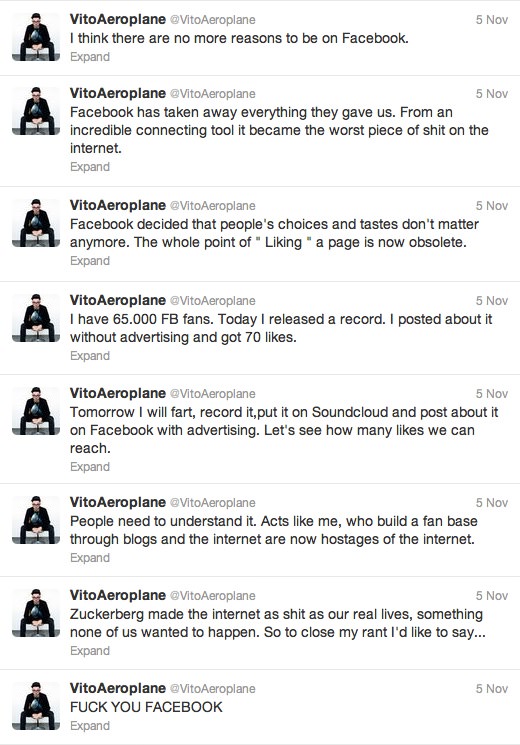Aeroplane’s Vito de Luca rants about Facebook’s role in helping artists to promote their work.

Story originally posted 09/11/12. Updated 09/01/13 with additional quotes from Vito.
Vito de Luca, the man better known as Aeroplane, spoke out on Twitter this week about Facebook’s failings as a promotional tool for musicians. In a series of posts on his account, the outspoken producer lamented his inability to target his own Facebook fans without paying to promote his posts. We’re reluctant to call it a rant, but… oh, go on. His rant read as follows:
I think there are no more reasons to be on Facebook. Facebook has taken away everything they gave us. From an incredible connecting tool it became the worst piece of shit on the internet. Facebook decided that people’s choices and tastes don’t matter anymore. The whole point of “Liking” a page is now obsolete. I have 65.000 Facebook fans. Today I released a record. I posted about it without advertising and got 70 likes. Tomorrow I will fart, record it, put it on Soundcloud and post it on Facebook with advertising. Let’s see how many likes we can reach. People need to understand it. Acts like me, who build a fan base through blogs and the internet are now hostages of the internet. Zuckerberg made the internet as shit as our real lives, something none of us wanted to happen. So to close my rant I’d like to say… FUCK YOU FACEBOOK.
The diatribe reflects a rising tide of discontent with the way Facebook presents content to fans of artists’ pages. Artists and DJs are increasingly concerned that their own fans – people who’ve gone out of their way to click that ‘Like’ button on their page – aren’t actually seeing their posts in their Facebook timeline. Of course – as the Quietus reiterates in a lengthy article
– nothing has actually changed. The same number of fans see pages now as they ever would have done. The fact that Facebook now displays reach figures for posts simply makes it easier for artists to see that a large proportion of their fans are missing out.
Facebook attempts to keep users’ timelines clean by filtering content slightly. The argument is that if every post by every one of your friends and every page you followed showed up on your timeline, you’d be overwhelmed each time you logged in (compare this system to Twitter, where many followers miss tweets simply because they’re not online at the time of posting and aren’t inclined to trawl back through pages of tweets each time they check their timeline).
The issue all comes down to a proprietary Facebook algorithm system known as Edgerank, which determines whether fans of a page should see each post based on their engagement with that page’s content – that is to say, how often they typically like, comment on, or share a post by that page. The less often you interact with an artist’s page, the less likely you are to see their posts in future. Page owners then have the option of paying to ‘promote’ individual posts, ensuring more of their fans see them.
As far as these systems go, Edgerank actually seems to make quite a lot of sense. If one of your Facebook fans never likes your posts, never interacts with your page and never comments on any of your statuses, chances are they’re not really interested in what you have to offer. As DJ Zinc pointed out this week
, forcing people to like your page in order to access a ‘free’ download is increasingly common. The end result is a Facebook follower number inflated by these promotional campaigns, but with a large number of ‘fans’ who hit the Like button just for freebies and actually don’t really care about what you have to say.
Many musicians are rather naive to assume that this issue only affects them. It’s a subject which is discussed in endless tedious detail by online marketing blogs (a lot of which, with a cruel twist of irony, are really just trying to generate page views with cheap recycled content in order to profit from ad revenue). Search Google for Edgerank and you’ll be met with
innumerable near-identical pages discussing the minutiae of the Edgerank algorithm
.
The fact that not everyone who likes your Facebook page will see all your posts isn’t really the most important issue here. Find us a marketing strategy which is 100% efficient and we’ll bite your hand off. Chances are those people who never interact with your page don’t want to buy your album anyway.
The more important question is whether Facebook is really even a good marketing tool for musicians. These days, so much effort is put into social media by artists and their promotion teams that it’s just assumed to be essential (just ask Lady Gaga’s manager). Paying to promote a post is just obviously the best approach, right? Well, no… The obvious answer isn’t always the right one.
Artists, whether they realise it or not – whether they like it or not – are acting as businesses here. Why should one business (the artist) expect another business (Facebook) to promote their product for free? Furthermore, shouldn’t it be obvious that a good business doesn’t invest a large proportion of its time and budget on an ineffective marketing strategy?
This really all boils down to a very simple question: if paying to promote your posts on Facebook helps you sell more records and get more bookings, do it; if it doesn’t, don’t.
Update 09/01/13. Vito writes:
“In your news story you mention how Facebook has been filtering the content of the newsfeed since the beginning, assuming that what [your friends] or pages that you like post isn’t of interest for you.
“I hear you say that if everything that was meant to be on our timeline was actually showing up this timeline would be flooded with information, and that, obviously, it’s not doable.
“But, someone paying to force content on people that they don’t want to see or didn’t choose to see doesn’t seem to concern Facebook, even if they were so concerned that we would get annoyed looking at a timeline full of stuff we decided to see.
“It’s obvious hypocrisy, double standards. And that is the problem I have with it.”
Vito’s comments in full:


03.35 PM
Very well put. Another reason posts aren’t showing up is that some pages post too often so Facebook made it easier to report/mark a page as spamming – every time a page gets reported, Edgerank overall is affected.
As you already said Social Media should only be one part of any marketing plan, the clue is even in the name. It’s supposed to be social, not a market. Facebook and Twitter et al, IMO, are best used as an artist to interact with fans and followers, not trying to sell them something as much as possible.
If all you’re doing is posting links and text updates about stuff to buy, it’s much less likely that fans will engage with your content. Less engagement means worse Edgerank.
Obviously this takes a bit of effort and finding out what your fans/followers are most likely to interact with, having a regular schedule of content and finding/creating the content itself. Conveniently, Facebook provided an option to bypass all that and you can promote posts to anyone you want as often as you want. It boggles the mind that people expect any kind of marketing/promotion to be handed to them free.
If it bothers you that much, place an ad instead – it’s exactly the same but you don’t need to call Facebook shit for using it wrong.
07.08 PM
But I think the point Vito was trying to make about facebook is that it feels a bit like a bait and switch. “Come to facebook and connect with all your fans for free!” ….then some months/years later after building up a fair number of followers “yeah, your fans, you gotta pay now to keep them informed”. everything said in the article is fair, but only in the context if the pay model were there from the start, which it wasn’t.
Suddenly MySpace looks appealing once more (did I just say that!?!?! 🙂
01.04 AM
I don’t think Facebook was ever intended to do that, it was built around friends connecting with friends. When companies and brands so that their audience was all in one place they wanted to get in on it – pages and non-personal profiles have not been around since the start.
The point as already been raised that posts on pages have never reached all of your fans, but now that Facebook has provided more analytics and data (for free) you can see just how ineffective it is to use it as your primary marketing tool.
10.39 PM
Companies didn’t just want to get in on it, they were invited, by Facebook.
Also, Facebook lets and has let you set up a band specific page for a while now, not from the start sure, but definately before they started to charge, so yeah it actually was intended to do that.
Either way, as stated yes Facebook is in fact a business not a service, so most, I will assume, will just move on to the next free (for now) network
09.19 PM
Never liked the concept of facebook.. Viva Soundcloud!
11.05 PM
I can’t stand rants like this. Here are some facts for you: Facebook is free. Facebook is a company that needs to profit. Nobody forces him to use Facebook to promote his music. Contrary to popular belief, Facebook doesn’t owe him anything. Conclusively, STFU stop whining like an entitled prick.
04.08 AM
….sorry dude, this is what youve all brought into reality with all this sjw weirdness. And if you own an API 1608 …..i really dont want to hear you complain about a Free App that wont let you promote your brand the way youd like to
?